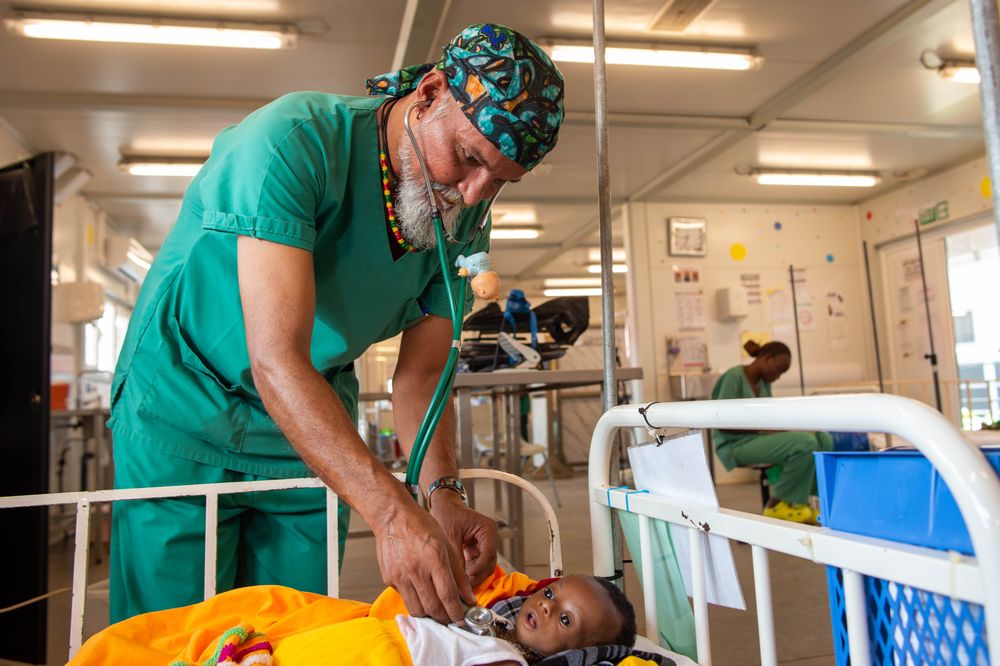Sierra Leone: Helping pregnant women reach the hospital in time



Despite major progress made this century, in 2020 Sierra Leone still ranked 18th in the list of countries with the highest number of women’s deaths in childbirth, with an estimated 443 maternal deaths per 100,000 live births, according to the World Health Organization.
Many women in Sierra Leone live in remote, rural areas, far from health facilities, and cannot afford the high cost of transport to reach a hospital. This is compounded by poor roads, a countrywide shortage of ambulances and a lack of proper patient referral mechanisms. By the time a woman experiencing complications in childbirth does manage to reach a hospital, it may be too late.
In order to ensure as many pregnant women as possible are able to receive the care they need, MSF operate ambulances in some of the most isolated regions of Sierra Leone. This lifesaving service helps bring women to get the antenatal support they, while also transferring critical patients to more equipped medical facilities.
“Late referrals can be fatal and some medical complications could be avoided if women with obstetric emergencies were able to reach health facilities on time.”
“We had a patient from Daama village, about two hours from our hospital, who was pregnant and was referred very late. When the doctors did a scan, they found out that the baby did not have a heartbeat. The mother was also very anaemic and in a critical condition.”
Amadu Musa, a nurse at MSF’s mother and child hospital in Hangha, Kenema district.


MSF’s team in Kenema carry out emergency caesareans and other lifesaving surgery for pregnant women and new mothers. MSF teams also work in two other locations in Sierra Leone – in Mile 91, and in Magburaka, Tonkolili district – to help local health staff respond to maternal and pediatric medical emergencies. In the first seven months of 2023, MSF teams in Kenema, Mile 91 and Magburaka helped 3,326 women deliver their babies, 505 of them by emergency caesarean.
This is 28-year-old Baindu Massaquoi holding her baby girl inside the maternity ward of the MSF Mother and Child Hospital in Hangha, Kenema District, Sierra Leone. This is Baindu’s second C-section.
“I have given birth to seven children but only two are alive. During each of my pregnancies I have always been going to the government health centres for antenatal care and delivery, but during this pregnancy, I was in the market selling when I felt a sharp pain and immediately started bleeding.”
“I knew my due date was still far away, so I decided to take a motorbike and quickly come to the MSF hospital in Hangha. That same day, I underwent a Cesarean section and right now I feel great. Both my baby and I will be discharged soon.”
MSF’s work in Sierra Leone also includes running an ambulance service to get women and children in need of emergency care to hospitals as fast as possible.




“There is a significant need for ambulances to transfer pregnant women experiencing complications from local clinics to hospitals.”
“A good referral system is key and needs to be prioritised to ensure a decrease in maternal and neonatal mortality and save more lives.”
Kennedy Uadiale, MSF medical coordinator
Between January and July 2023, MSF’s eight ambulances transferred 372 pregnant women and new mothers with their babies to a hospital for emergency care. The women faced a range of life-threatening conditions including pregnancy-induced hypertension, post-partum haemorrhage, anaemia in pregnancy and antepartum haemorrhage.
MSF also reimburses women for the cost of taking a motorbike-taxi, the only alternative transportation available in most places, to health facilities paying for 900 trips in the first seven months of 2023.
Meet some of the MSF maternity patients in Sierra Leone

18 year old, Fatmata Fofanah, walking around the maternity in the MSF-supported Magburaka Government Hospital, Tonkolili District, assisted by a Ministry of Health and Sanitation midwife. Fatmata gave birth inside the MSF ambulance assisted by an MSF midwife while she was being referred to the Magburaka Government Hospital from the Hinistas Community Health Center in Mile 91, both supported by MSF. She and her baby were discharged a few days later, fully recovered.
Umu Jalloh, 35 years old, is carrying her twin boys in the triage area of the Hinistas Community Health Centre (CHC) in Mile 91, Tonkolili District. Her children were screened for malnutrition and given ready-to-use therapeutic food. She was requested to come for regular check-ups with her children to ensure they regain their health.
Seven-month pregnant Aminata Bangura can be seen walking to the Petifu Fullamasa Peripheral Health Unit, Tonkolili District, for antenatal care. In order to ensure her and her baby continue regular check-ups, Aminata walks close to one hour to get to the nearest primary health facility, as motorbikes are very expensive in the community.
18-year-old Umu Ngamanga is holding her one-day-old baby boy in front of the Tiama River, which she has to cross in order to reach the MSF-supported Foindu Peripheral Health Unit, Tonkolili District, in the Northern Province of Sierra Leone.
“I started experiencing labour pains at night, but it takes me two hours of walking and crossing a river to get to the nearest peripheral health unit, which is in Foindu, 10 kilometres from my home. My baby could not eat and had fever, so I took him to the peripheral health unit the next day after I gave birth. He was immediately taken by motorbike to Hinistas Clinic in Mile 91. After close monitoring, he was later taken to the Magburaka Government Hospital by the MSF ambulance and after receiving care he got well and was discharged”.
MSF has also trained traditional birth attendants in Kenema district to monitor pregnant women and watch out for danger signs, referring them to the closest health centre for medical attention, or calling an MSF ambulance to take them to hospital if they need advanced care.





